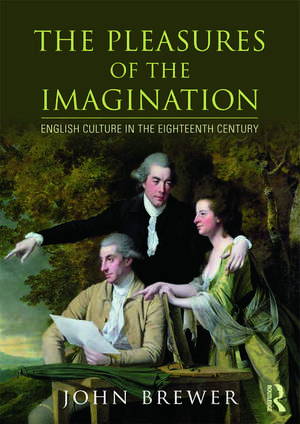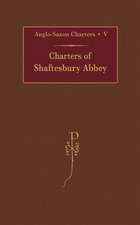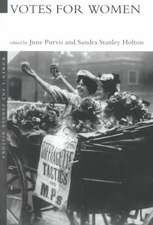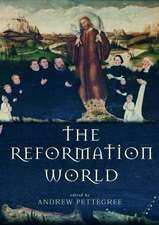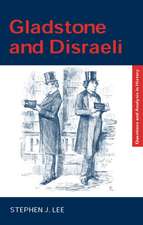The Pleasures of the Imagination: English Culture in the Eighteenth Century
Autor John Breweren Limba Engleză Paperback – 12 mar 2013
John Brewer's enthralling book explains how this happened and recreates the world in which the great works of English eighteenth-century art were made. Its purpose is to show how literature, painting, music and the theatre were communicated to a public increasingly avid for them. It explores the alleys and garrets of Grub Street, rummages the shelves of bookshops and libraries, peers through printsellers' shop windows and into artists' studios, and slips behind the scenes at Drury Lane and Covent Garden. It takes us out of Gay and Boswell's London to visit the debating clubs, poetry circles, ballrooms, concert halls, music festivals, theatres and assemblies that made the culture of English provincial towns, and shows us how the national landscape became one of Britain's greatest cultural treasures. It reveals to us a picture of English artistic and literary life in the eighteenth century less familiar, but more suprising, more various and more convincing than any we have seen before.
| Toate formatele și edițiile | Preț | Express |
|---|---|---|
| Paperback (1) | 497.06 lei 6-8 săpt. | |
| Taylor & Francis – 12 mar 2013 | 497.06 lei 6-8 săpt. | |
| Hardback (1) | 1027.81 lei 6-8 săpt. | |
| Taylor & Francis – 12 mar 2013 | 1027.81 lei 6-8 săpt. |
Preț: 497.06 lei
Preț vechi: 584.78 lei
-15% Nou
Puncte Express: 746
Preț estimativ în valută:
95.12€ • 97.42$ • 79.13£
95.12€ • 97.42$ • 79.13£
Carte tipărită la comandă
Livrare economică 18 martie-01 aprilie
Preluare comenzi: 021 569.72.76
Specificații
ISBN-13: 9780415658850
ISBN-10: 0415658853
Pagini: 576
Ilustrații: 246 Illustrations, black and white
Dimensiuni: 174 x 246 x 32 mm
Greutate: 1.14 kg
Ediția:1
Editura: Taylor & Francis
Colecția Routledge
Locul publicării:Oxford, United Kingdom
ISBN-10: 0415658853
Pagini: 576
Ilustrații: 246 Illustrations, black and white
Dimensiuni: 174 x 246 x 32 mm
Greutate: 1.14 kg
Ediția:1
Editura: Taylor & Francis
Colecția Routledge
Locul publicării:Oxford, United Kingdom
Public țintă
General, Postgraduate, and UndergraduateCuprins
Preface. Introduction. Part 1. Contexts Part 2. Print Part 3. Paint Part 4. Performance Part 6. Province and Nation Part 7. Britain. Conclusion. Bibliography. Sources of Illustration. Index.
Recenzii
"[T]his history book is now, for me, the last word on how British literary culture changed between the last days of the early modern period and the Victorian age ... give this book as a present to your favourite amateur historian: they will love you for it." - Kate Macdonald, Vulpes Libris
"Pleasures of the Imagination paints a kaleidoscopic picture of eighteenth-century culture that is both erudite and accessible." - Heather Mcpherson, University of Alabama at Birmingham
"If you want to understand how British culture reinvented itself in the eighteenth century, read The Pleasures of the Imagination... Like all really original achievements it makes us sharply rethink things we supposed we knew well, but it does so with humour and humanity, and through the text runs Brewer's remarkable intellect: forceful, lucid and penetrating." - Simon Schama
"The Pleasures of the Imagination is a splendid cornucopia of a book. It describes the contortions of the eighteenth century as it developed a culture... It is full of pure delight... The marvel of this book is that in writing in exuberant detail about the past, Brewer succeeds in illuminating the present... This book wears its massive scholarship lightly. I hope some of our new political masters have time to read it, for it is a history that teaches us many lessons." - Peter Hall, The Observer
"Brewer ranges over almost every corner of the English mind with sharp, darting observation... Brewer is perceptive, amusing and thorough wherever he strays. This is by far the most complete and up-to-date account of the evolving Georgian arts... We are shown round a society aiming at Rome but often hitting Babylon, with the combined attitutes of fin-de siecle Paris and of Las Vegas. This is a book to treasure as it treasures a past we thought we had lost." - Pat Rogers, Sunday Telegraph
"A model of the new cultural history... In Britons, Linda Colley highlighted the new political, patriotic and religious tides which flowed in the Georgian age, creating a fresh confidence and sense of national identity... The Pleasures of the Imagination confirms this view of the main of the public mind. It shows how the English came to feel not just strong but civilized too, polite as well as powerful. God's chosen people, of the age of Cromwell, were reinventing themselves as Shakespeare's heirs." - Roy Porter, The Independent
"Pleasures of the Imagination paints a kaleidoscopic picture of eighteenth-century culture that is both erudite and accessible." - Heather Mcpherson, University of Alabama at Birmingham
"If you want to understand how British culture reinvented itself in the eighteenth century, read The Pleasures of the Imagination... Like all really original achievements it makes us sharply rethink things we supposed we knew well, but it does so with humour and humanity, and through the text runs Brewer's remarkable intellect: forceful, lucid and penetrating." - Simon Schama
"The Pleasures of the Imagination is a splendid cornucopia of a book. It describes the contortions of the eighteenth century as it developed a culture... It is full of pure delight... The marvel of this book is that in writing in exuberant detail about the past, Brewer succeeds in illuminating the present... This book wears its massive scholarship lightly. I hope some of our new political masters have time to read it, for it is a history that teaches us many lessons." - Peter Hall, The Observer
"Brewer ranges over almost every corner of the English mind with sharp, darting observation... Brewer is perceptive, amusing and thorough wherever he strays. This is by far the most complete and up-to-date account of the evolving Georgian arts... We are shown round a society aiming at Rome but often hitting Babylon, with the combined attitutes of fin-de siecle Paris and of Las Vegas. This is a book to treasure as it treasures a past we thought we had lost." - Pat Rogers, Sunday Telegraph
"A model of the new cultural history... In Britons, Linda Colley highlighted the new political, patriotic and religious tides which flowed in the Georgian age, creating a fresh confidence and sense of national identity... The Pleasures of the Imagination confirms this view of the main of the public mind. It shows how the English came to feel not just strong but civilized too, polite as well as powerful. God's chosen people, of the age of Cromwell, were reinventing themselves as Shakespeare's heirs." - Roy Porter, The Independent
Notă biografică
John Brewer is Eli and Edye Broad Professor of Humanities and Social Sciences at the California Institute of Technology. His publications include, with Roy Porter, Consumption and the World of Goods in the 17th and 18th Centuries, (Routledge, 1993), with Ann Bermingham, The Consumption of Culture: Word, Image, and Object in the 17th and 18th Centuries, (Routledge, 1995), A Sentimental Murder. Love and Madness in the Eighteenth Century (2004), with Frank Trentmann, Consuming Cultures, Global Perspectives: Historical Trajectories, Transnational Exchanges (2006), The American Leonardo: a 20th-century tale of obsession, art and money (2009).
Descriere
The Pleasures of the Imagination examines the birth and development of English "high culture" in the eighteenth century. It charts the growth of a literary and artistic world fostered by publishers, theatrical and musical impresarios, picture dealers and auctioneers, and presented to th public in coffee-houses, concert halls, libraries, theatres and pleasure gardens. In 1660, there were few professional authors, musicians and painters, no public concert series, galleries, newspaper critics or reviews. By the dawn of the nineteenth century they were all aprt of the cultural life of the nation.
